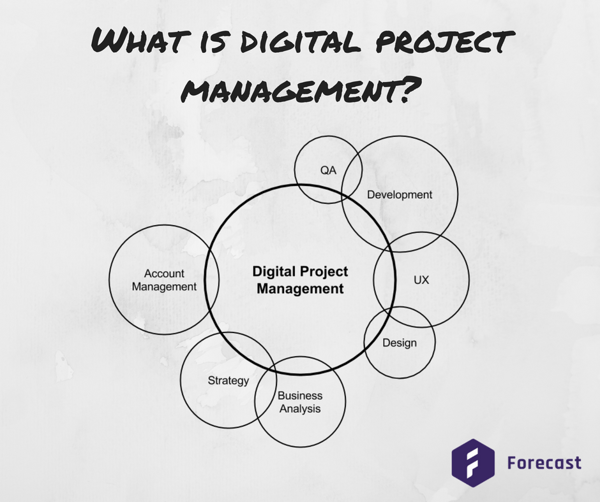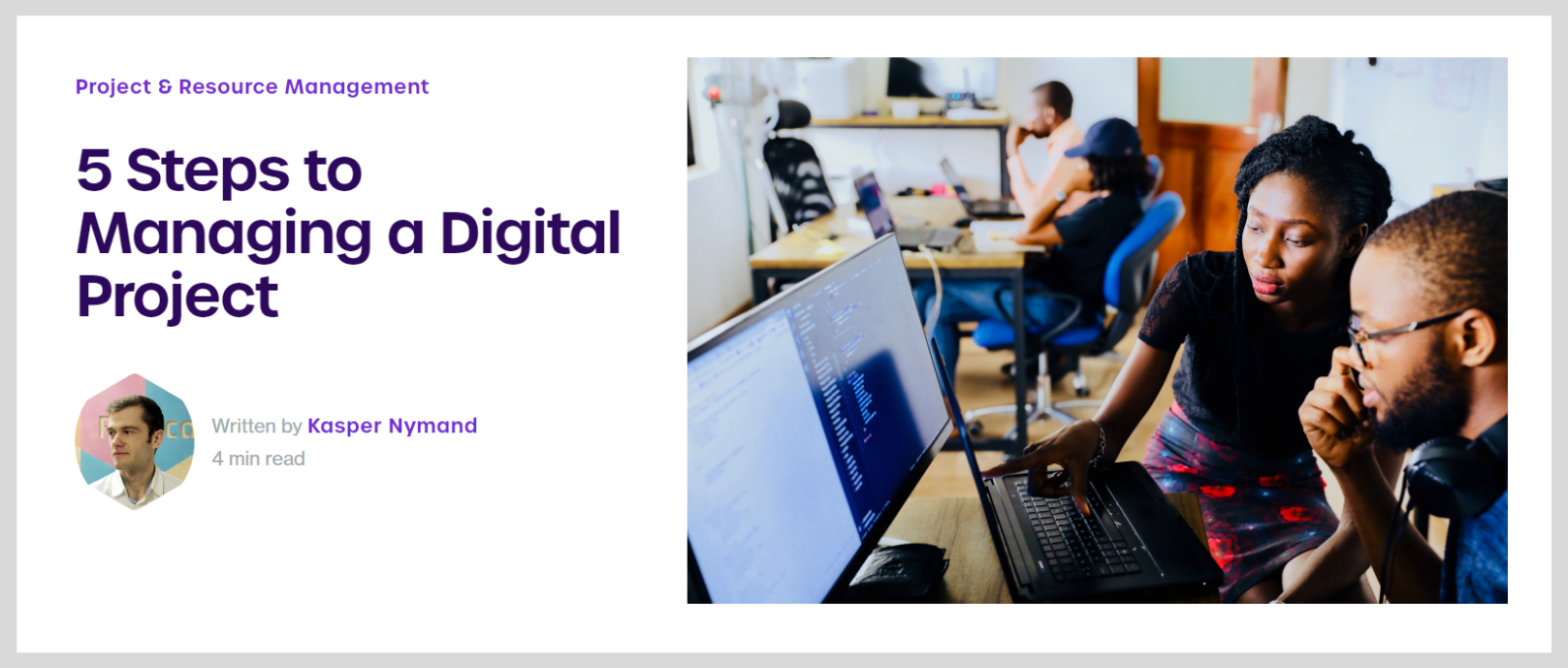What is Digital Project Management?

The simple answer might be project management of projects in the digital world; a virtual product you could say. And yes, this is true. But as simple as it might sound, there are definitely some differences between “traditional” and digital project management to be aware of. A digital project is also often distinguished from an IT project, in the sense that digital projects are often more creative in style, where’s plain IT projects are often more into the hardcore enterprise market.
Those differences are exactly what we will cover in this blog post; with a focus on the digital project manager.
First of all, is the skill set the digital project manager must possess compared to the one of the traditional project manager. Some skills are of course beneficial across both types of projects, such as communication skills, analysis and reporting, being able to present the overall perspective while keeping a balance in what you need to be a part of, and what is best left for the team itself. Other skills are more specific to the digital world. In the end, it all depends on the industry you’re managing.
The project manager is engaged in all parts of the project, from the strategic planning to the implementation stage, and therefore must possess a variety of skills. We must be able to collaborate with everybody, bring everything together, and make sure that everything stays on-track and gets delivered in time and on budget. Any lack of any of these might cause major problems during execution and by the delivery of the project.

As Sam Barnes defines it, “Project Managers have to master the art of being the office chameleon, blending into very different environments at the drop of a hat. One minute you’re talking to irate developers about server issues and working out how best to help resolve the issue, the next you’re in a Director’s office talking about financial reporting and finally followed up by briefing a photographer on the creative direction you’d like them to take.”
Digital project management is often easier to track than other project types, since most of the work needed is carried out behind a screen, on a computer. Digital tasks are easily tracked automatically and reported with various tools, and thus provides a better foundation for reliable time reports and estimations. These estimations are vital for forecasting deadlines and budgets, and is thus crucial for business success.
A good digital project manager has to be able to communicate with both the technical teams and the business teams. He / she must be able to understand the terminology of both parts, and be the funnel that moves important information between the two. Having an overview is crucial, and digging deep is paramount.
DEVELOPMENT • Keep the software developers up-to-date, and aligned with the current business strategy. What is the prioritization and why? Make sure everybody is on the same page.
UX / DESIGN • Work with the user experience and design teams to deliver the maximum quality output based on the prioritizations and current business strategy. User experience is after all what keeps customers happy and loyal.
QUALITY ASSURANCE • QA goes hand-in-hand with UX. Keep the teams aligned, and ensure a continuous proactive, progressive and quality-based development. Focus on value for the customer.
BUSINESS ANALYSIS • Make sure the business is profitable at all times, or at least working towards a growing profitable state. Analyze your project portfolio, and focus on the most valuable projects and clients. Value is key to a successful business.
STRATEGY • Develop and fine-tune your strategy on a regular basis. Strategy is the top-level foundation on which to build the rest of the business upon. Make sure it’s healthy and flexible.
ACCOUNT MANAGEMENT • Keep important clients and relations engaged at all times. A major part of running a successful business is to build relationships between people, big and small.
COLLABORATION • A collaborative environment across teams is probably the most important factor for a healthy progressive business. Keep everybody engaged and satisfied as you would your important clients. Those people are the ones that will build the value your clients pay for.
Your company culture is transparent to your customers.
Using a project management tool can be of great advantage, since this gives the team and project manager a central hub that connects the whole team, and becomes the go-to-place for all of your data and files. If a task needs to get moved to another person, it only takes a click of a button, and that particular team member has everything he or she needs; all the files, comments, estimations, and so forth. Or, if you need an extra person working on a task, you can easily pick one that’s available, and get things going in no time.
There are many great tools out there; all with different combinations of features and user experiences. Ours, Forecast, uses machine-learning to forecast your future estimates on the task-level and all the way up. It uses previous data collected on the business, and across organizations, the type of project, the type of task, the people involved, and the labels assigned to the task. All of these are parts of the algorithm, which helps you in predicting time and budget across all of your projects. In the end, giving you more reliable and actionable insights on your business, and making you able to deliver profitable projects on time, and on budget.
Like what you read? Here are some other articles you might also enjoy:
- 5 Steps to Managing a Digital Project
- Profit Pitfalls in Digital Agencies and How to Avoid Them
- Challenges of Creative Agencies - and How to Deal with them
Subscribe to the Forecast Newsletter
Get a monthly roundup of productivity tips & hacks delivered straight to your inbox
